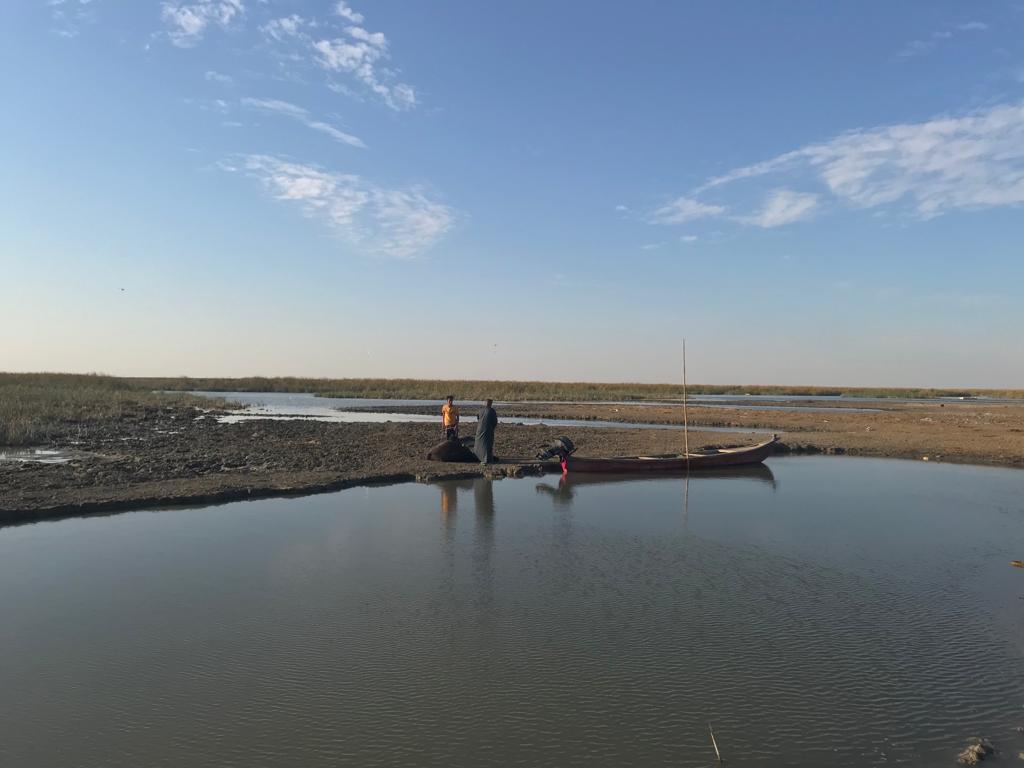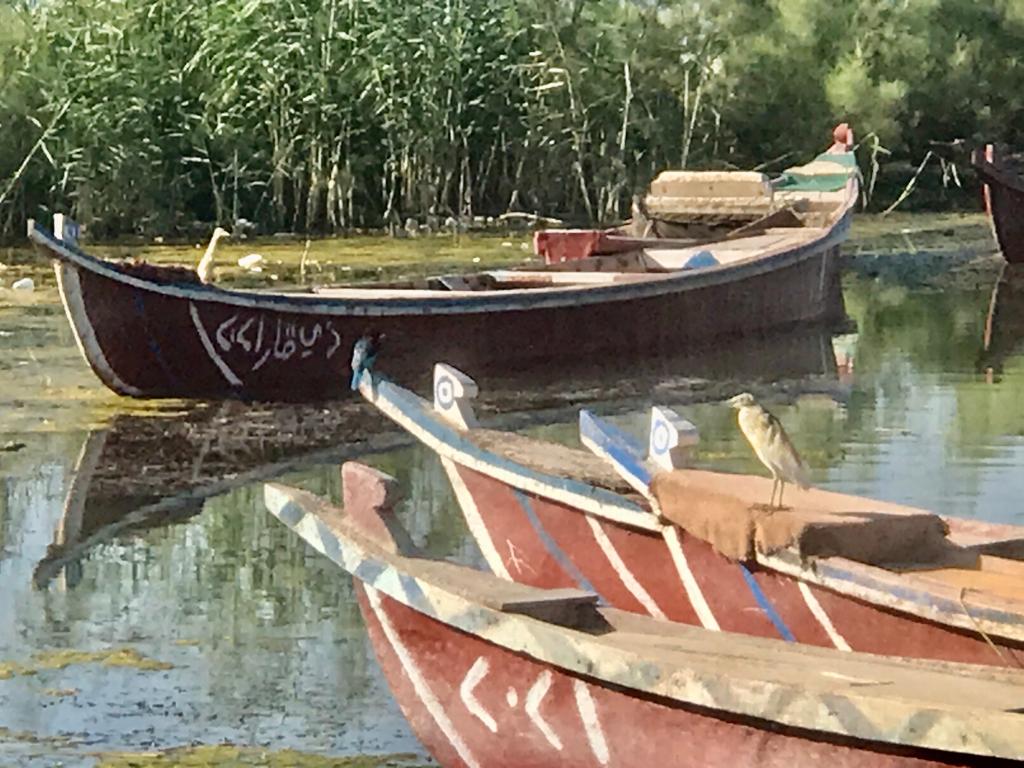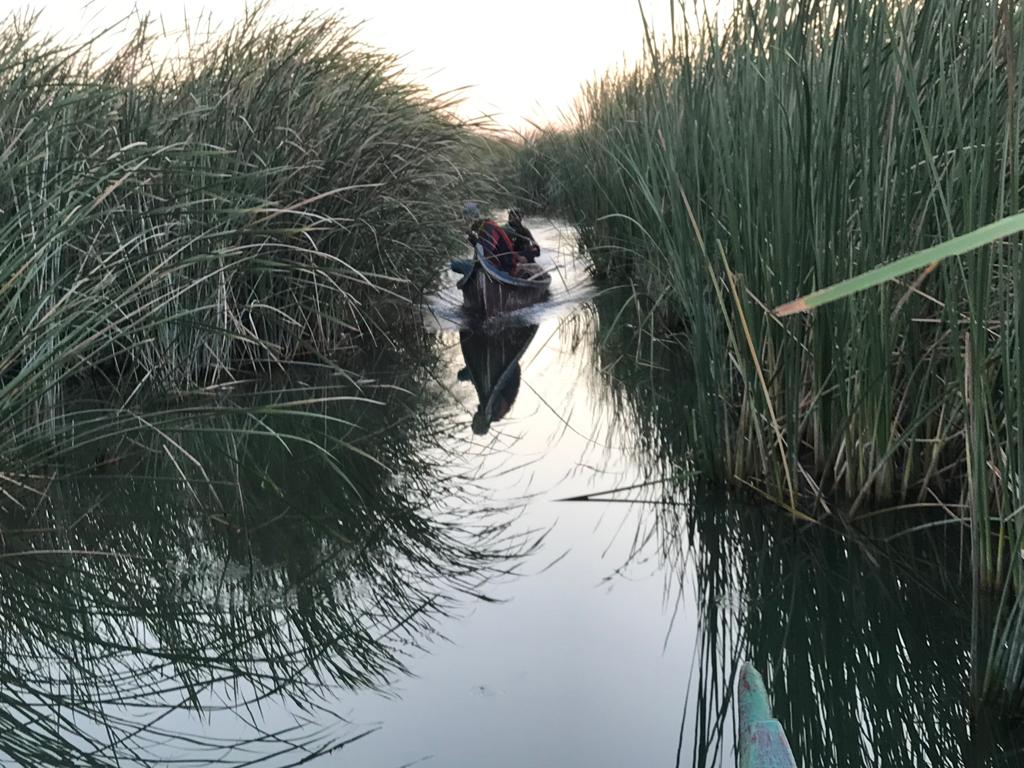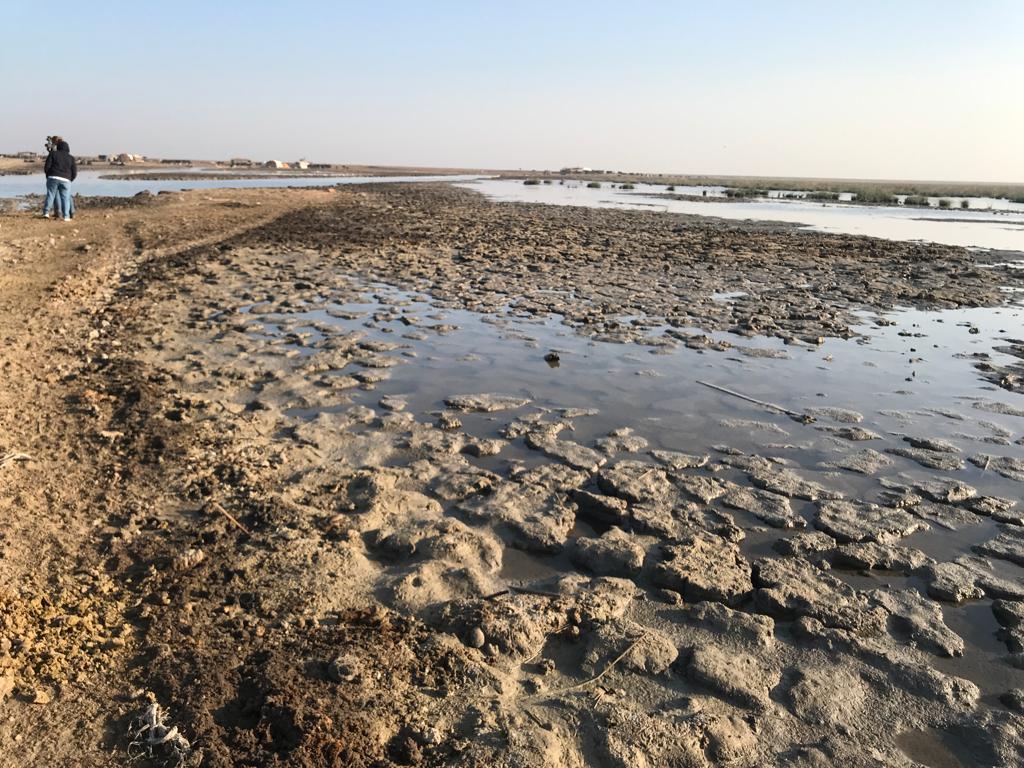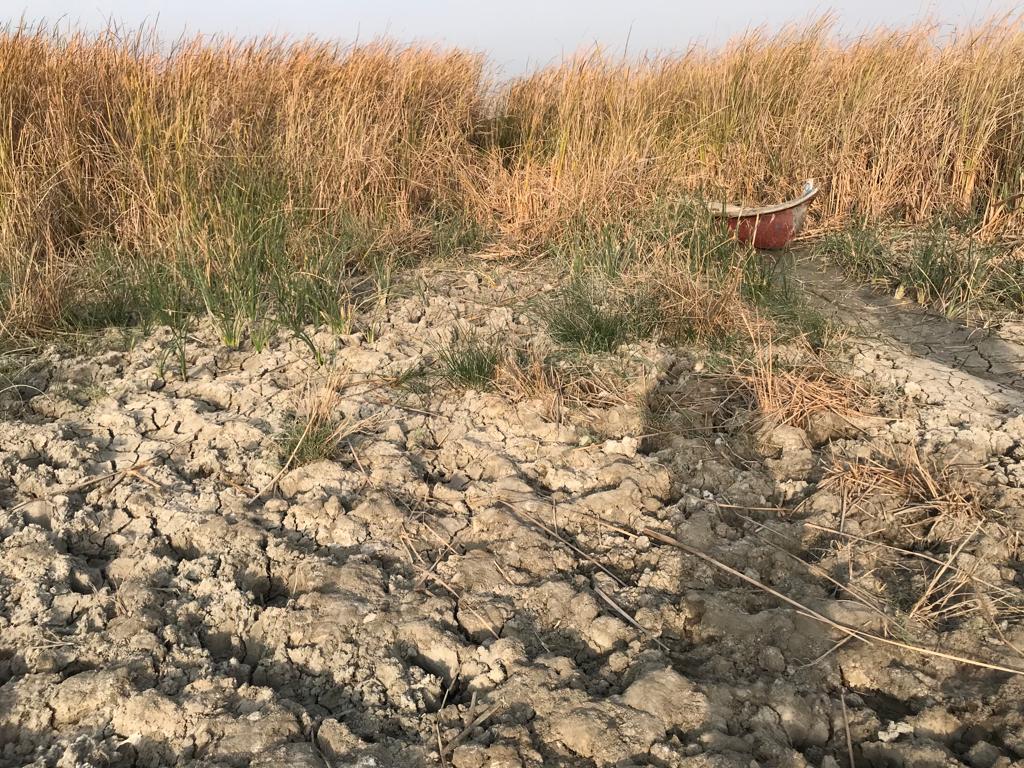Join us for CMok's World Wetlands Day celebration on February 5, 2022, online. You can watch us on Facebook (please sign up here) and YouTube. The whole event will be streamed in original (generally English, French for one presentation), as well as with Polish simultaneous interpretation.
Przedstawiamy program obchodów Światowego Dnia Mokradeł organizowanych przez CMok 5 lutego 2022 roku, online. Wydarzenie bedzie można obejrzeć na Facebooku (zachęcamy do oznaczenia obecności na wydarzeniu) i YouTube. Całe wydarzenie będzie transmitowane w oryginale (generalnie po angielsku, w przypadku jednej prezentacji po francusku) wraz z tłumaczeniem symultanicznym na język polski.
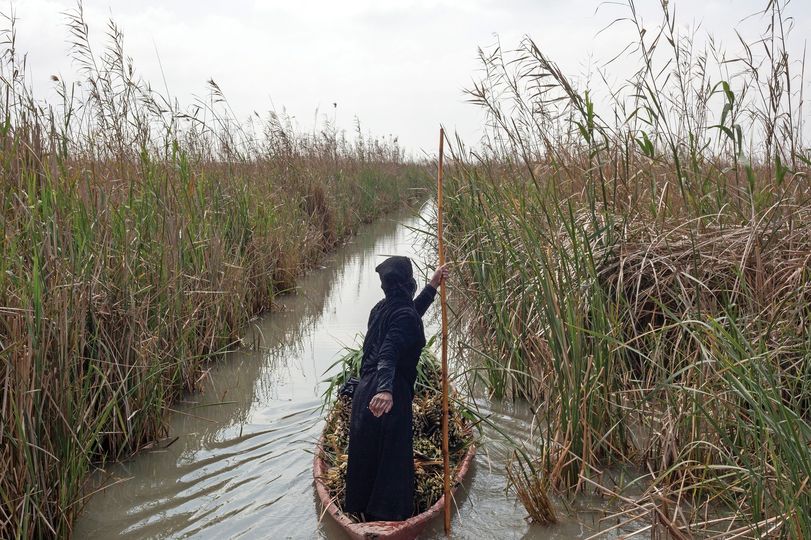
Hamdiya, age 50, while harvesting reeds in the wetlands of southern Iraq's Al Ahwar./ Hamdiya, lat 50, w trakcie zbioru trzciny na mokradłach południowego Iraku Al Ahwar. (photo: Tamara Abdul Hadi)
We all come from there. In an act of humanitarian solidarity, we decided to dedicate this year's World Wetlands Day event to all the migrant people who suffer and die in the Polish and Belarusian wetlands. This year's WWD conference will be all about the Middle East and Africa’s wetlands, and the people associated with them. Our speakers are:
Stamtąd wszyscy przyszliśmy. Organizowane w tym roku przez Centrum Ochrony Mokradeł obchody Światowego Dnia Mokradeł będą poświęcone krajom, z których pochodzą uchodźcy, którzy znaleźli się na polsko-białoruskiej granicy. Konferencja odbędzie się z udziałem prelegentów z Bliskiego Wschodu oraz Północnej i Środkowej Afryki. Nasi prelegenci:
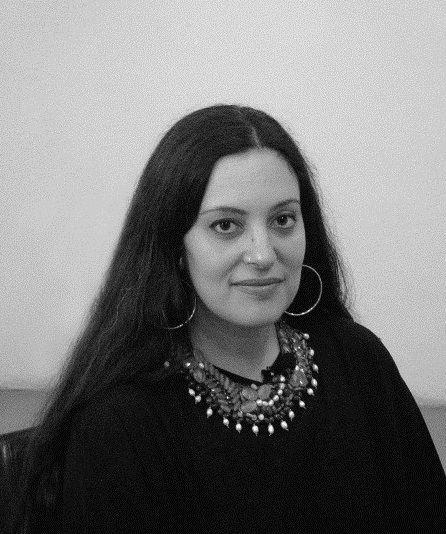 Tamara Abdul Hadi (Iraq / Canada) – Iraqi photographer whose work is concerned with the historic and contemporary representation of her own culture, in its diversity. Her work has been published in The New York Times, The Guardian, The Wall Street Journal, The Financial Times, The National, Huck Magazine, VICE, Slate and more and exhibited in UAE, Lebanon, Kuwait, France, the UK, Sweden, Spain, Hungary, Canada and the US. Abdul Hadi was a founding member of Rawiya Collective, a photography co-operative of female photographers in the Middle East. On February 5th Tamara will show photographs she made over last years in Mesopotamian wetlands Al Ahwar, reporting from the contemporary life of their inhabitants, called Marsh Arabs.
Tamara Abdul Hadi (Iraq / Canada) – Iraqi photographer whose work is concerned with the historic and contemporary representation of her own culture, in its diversity. Her work has been published in The New York Times, The Guardian, The Wall Street Journal, The Financial Times, The National, Huck Magazine, VICE, Slate and more and exhibited in UAE, Lebanon, Kuwait, France, the UK, Sweden, Spain, Hungary, Canada and the US. Abdul Hadi was a founding member of Rawiya Collective, a photography co-operative of female photographers in the Middle East. On February 5th Tamara will show photographs she made over last years in Mesopotamian wetlands Al Ahwar, reporting from the contemporary life of their inhabitants, called Marsh Arabs.
Tamara Abdul Hadi (Irak / Kanada) – Iracka fotografka, której prace dotyczą historycznego i współczesnego oblicza jej kultury, w jej różnorodności. Jej prace były publikowane w The New York Times, The Guardian, The Wall Street Journal, The Financial Times, The National, Huck Magazine, VICE, Slate i innych, a także wystawiane w Zjednoczonych Emiratach Arabskich, Libanie, Kuwejcie, Francji, Wielkiej Brytanii, Szwecji, Hiszpanii, na Węgrzech, w Kanadzie i USA. Abdul Hadi była członkinią założycielką Rawiya Collective, spółdzielni fotograficznej zrzeszającej kobiety fotografki na Bliskim Wschodzie. 5 lutego Tamara pokaże zdjęcia, które wykonała w ciągu ostatnich lat na mezopotamskich mokradłach Al Ahwar, relacjonując współczesne życie ich mieszkańców, zwanych Arabami Bagiennymi.

Dr. Azzam Alwash (Iraq) – Iraqi ecologist and environmental activist, founder of the Eden Again, a program to put the spotlight on the drying of the marshes of southern Iraq, under the auspices of the Free Iraq Foundation, where he is a member of the board of directors. Emigrated to USA in 1978, where he obtained Ph.D. in Civil Engineering from the University of Southern California (1988). After the removal of Saddam Hussein, he moved back to Iraq to work on the restoration of the marshes and founded Nature Iraq, an Iraqi NGO focusing on the preservation of the environment of Iraq and its cultural heritage. An effort that earned him the Takreem Award in 2011 and The Goldman Environmental Prize for 2013 as well as being designated one of the 100 forward-thinking leaders of the world by the Foreign Policy Group in 2013. Dr. Alwash is working now on issues of water and the environment through Nature Iraq and the American University of Iraq in Sulaimani (of which he is a co-founder) to promote the idea of cooperation on water management and making water an instrument of peace rather than the source of tension in the future Middle East.
Dr Azzam Alwash (Irak) – Iracki ekolog i aktywista ekologiczny, założyciel Eden Again, programu mającego na celu zwrócenie uwagi na osuszanie bagien w południowym Iraku, prowadzonego pod auspicjami Free Iraq Foundation, gdzie jest członkiem zarządu. W 1978 r. wyemigrował do USA, gdzie uzyskał tytuł doktora inżynierii cywilnej na Uniwersytecie Południowej Kalifornii (1988). Po odejściu Saddama Husajna wrócił do Iraku, aby pracować nad odtwarzaniem bagien i założył Nature Iraq, iracką organizację pozarządową zajmującą się ochroną środowiska naturalnego Iraku i jego dziedzictwa kulturowego. Wysiłek ten przyniósł mu nagrodę Takreem Award w 2011 roku oraz The Goldman Environmental Prize w 2013 roku, jak również nominację do grona 100 myślących przyszłościowo liderów świata przez Foreign Policy Group w 2013 roku. Dr Alwash pracuje obecnie nad kwestiami wody i środowiska poprzez Nature Iraq i American University of Iraq w Sulaimani (którego jest współzałożycielem), aby promować ideę współpracy w zakresie gospodarki wodnej i uczynienia z wody narzędzia pokoju, a nie źródła napięć na Bliskim Wschodzie.
 Salman Khairalla (Iraq, Tigris River Protectors Association) – activist involved in conservation and solving conflicts around access to water. As a 15-year-old boy, he fled the civil war in Baghdad and began working for the Iraq Institute (now Nature Iraq). As he writes, "a passion for the environment became a refuge from war, ethnic violence, and constant conflict". While still a student at the Department of Environmental Sciences at Kufa University in Najaf, Iraq, Salman Khaitalla took on the coordination of "Save the Tigris", an international civil society campaign to protect Mesopotamia's heritage and water resources from the effects of unsustainable management and climate change. He is also the founder and director of "Humat Dijlah" (Tigris River Defenders Association). Thanks in part to his work, the marshes of southern Iraq were inscribed on the UNESCO World Heritage List in 2016.
Salman Khairalla (Iraq, Tigris River Protectors Association) – activist involved in conservation and solving conflicts around access to water. As a 15-year-old boy, he fled the civil war in Baghdad and began working for the Iraq Institute (now Nature Iraq). As he writes, "a passion for the environment became a refuge from war, ethnic violence, and constant conflict". While still a student at the Department of Environmental Sciences at Kufa University in Najaf, Iraq, Salman Khaitalla took on the coordination of "Save the Tigris", an international civil society campaign to protect Mesopotamia's heritage and water resources from the effects of unsustainable management and climate change. He is also the founder and director of "Humat Dijlah" (Tigris River Defenders Association). Thanks in part to his work, the marshes of southern Iraq were inscribed on the UNESCO World Heritage List in 2016.
Salman Khairalla (Irak, Tigris River Protectors Association) – aktywista zaangażowany w ochronę przyrody i rozwiązywanie konfliktów wokół dostępu do wody. Jako piętnastoletnie chłopak uciekł przed wojną domową w Bagdadzie i zaczął pracować w organizacji „Iraq Institute” (obecnie Nature Iraq). Jak pisze, „pasja do środowiska stała się schronieniem przed wojną, przemocą etniczną i ciągłymi konfliktami”. Jeszcze w czasie studiów na wydziale Nauk o Środowisku na Uniwersytecie Kufa w Najaf (Irak) Salman Khaitalla zajął koordynacją akcji „Save the Tigris” - międzynarodowej kampanii na rzecz społeczeństwa obywatelskiego, której celem jest ochrona dziedzictwa i zasobów wodnych Mezopotamii przed skutkami niezrównoważonego zarządzania i zmian klimatycznych. Jest też założycielem i dyrektorem organizacji "Humat Dijlah" (Stowarzyszenie Obrońców Rzeki Tygrys). Między innymi dzięki jego działaniom bagna południowego Iraku zostały wpisane na Listę Światowego Dziedzictwa UNESCO w 2016 roku.
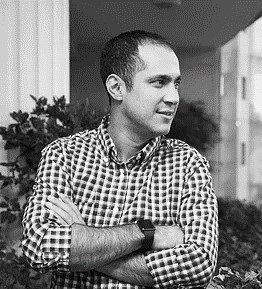
Dr. Kaveh Madani (Iran/ USA) – scientist, activist, the Head of the Nexus Research Program at the United Nations University in Dresden (Germany) and a Research Professor at the CUNY Crest Institute of the City College of New York; the former Deputy Head of Iran's Department of Environment (also Iran's Deputy Vice President). He also served as the Vice President of the United Nations Environmental Assembly Bureau from 2017 to 2018. His research and outreach activities have influenced water policy in Iran. He also has played a major role in raising public awareness about Iran's water and environmental problems in recent years. On February 5th, Kaveh Madani will join for interview and discussion about what can be done about the looming crisis of a global drought, based on his TEDx talk ‘Water: think again’.
Dr Kaveh Madani (Iran/ USA) – naukowiec, aktywista, szef programu badawczego Nexus na Uniwersytecie Narodów Zjednoczonych w Dreźnie (Niemcy) oraz profesor w CUNY Crest Institute w City College w Nowym Jorku; były zastępca szefa irańskiego Departamentu Środowiska (także wiceprezydent Iranu). W latach 2017-2018 pełnił również funkcję wiceprzewodniczącego Biura Zgromadzenia Narodów Zjednoczonych ds. Środowiska. Jego badania i działania zewnętrzne wpłynęły na politykę wodną w Iranie. Odegrał również ważną rolę w podnoszeniu świadomości społecznej na temat irańskich problemów związanych z wodą i środowiskiem w ostatnich latach. 5 lutego, Kaveh Madani udzieli wywiadu, co można zrobić z nadciągającym kryzysem globalnej suszy, w oparciu o jego wykład na platformie TEDx "Water: think again" i włączy się do dyskusji plenarnej.

Dr. Samer Elshehawi (Egypt / Germany) – is an ecohydrologist and associate researcher at the Greifswald Mire Centre in Germany. Currently, he is the coordinator for the Nile Basin Peatland project and author of ‘Groundwater isotopes and ecohydrological analysis of peatland landscapes’ (PhD 2019; University of Groningen, the Netherlands) and ‘Assessment of Carbon (CO2) emissions avoidance potential from the Nile Basin peatlands’, which will be the topic of his contribution at our WWD meeting.
Dr Samer Elshehawi (Egipt / Niemcy) – jest ekohydrologiem zatrudnionym w Greifswald Mire Centre w Niemczech, gdzie jest obecnie koordynatorem projektu dotyczącego torfowisk zlewni Nilu. Obronił doktorat na Uniwersytecie w Groningen (Holandia) za pracę "Groundwater isotopes and ecohydrological analysis of peatland landscapes" (Zastososwanie izotopowej analizy wody podziemnej w ekohydrologicznych badaniach torfowisk) jest też autorem raportu "Assessment of Carbon (CO2) emissions avoidance potential from the Nile Basin peatlands" (Ocena potencjału ograniczenia emisji dwutlenku węgla z torfowisk w zlewni Nilu), które będzie tematem jego wystąpienia na naszym spotkaniu WWD.
D r. Karounga Keita (Mali) – regional director of Wetlands International for the region of African Sahel, in Bamako, Mali. Dr. Karounga Keita has more than 32 years’ experiences, either at high level with Mali government or with private sector. He was Sr. Economist and Team Leader/Senior governance Advisor with UNDP in many countries (Mali, Burundi, Burkina Faso, Democratic Republic of Congo) as well as author of many National Sustainable Development Strategies (Congo Brazzaville, Comoros) and Mali 2015 report on Food Security for FAO. Karounga Keita holds a PhD in economics, and did postgraduate studies in political sciences and international relations. On February 5th, dr Keita will talk about the impact of wetland degradation on livelihoods and migrations in his region: “Tens of millions of people depend on the vitality of African wetlands. Migration is an established and valued livelihood strategy in the Sahel. The continuing loss and degradation of wetlands is contributing to new and often disruptive migrations, including to Europe.”
r. Karounga Keita (Mali) – regional director of Wetlands International for the region of African Sahel, in Bamako, Mali. Dr. Karounga Keita has more than 32 years’ experiences, either at high level with Mali government or with private sector. He was Sr. Economist and Team Leader/Senior governance Advisor with UNDP in many countries (Mali, Burundi, Burkina Faso, Democratic Republic of Congo) as well as author of many National Sustainable Development Strategies (Congo Brazzaville, Comoros) and Mali 2015 report on Food Security for FAO. Karounga Keita holds a PhD in economics, and did postgraduate studies in political sciences and international relations. On February 5th, dr Keita will talk about the impact of wetland degradation on livelihoods and migrations in his region: “Tens of millions of people depend on the vitality of African wetlands. Migration is an established and valued livelihood strategy in the Sahel. The continuing loss and degradation of wetlands is contributing to new and often disruptive migrations, including to Europe.”
Dr. Karounga Keita (Mali) – dyrektor regionalny Wetlands International na region afrykańskiego Sahelu, w Bamako, Mali. Dr Karounga Keita ma ponad 32-letnie doświadczenie, zdobyte na wysokim szczeblu w malijskim rządzie lub w sektorze prywatnym. Był starszym ekonomistą i kierownikiem zespołu/starszym doradcą ds. zarządzania w UNDP w wielu krajach (Mali, Burundi, Burkina Faso, Demokratyczna Republika Konga), jak również autorem wielu narodowych strategii zrównoważonego rozwoju (Kongo Brazzaville, Komory) oraz raportu o bezpieczeństwie żywnościowym Mali 2015 dla FAO. Karounga Keita posiada tytuł doktora nauk ekonomicznych, a także ukończył studia podyplomowe z zakresu nauk politycznych i stosunków międzynarodowych. 5 lutego dr Keita będzie mówił o wpływie degradacji terenów podmokłych na źródła utrzymania i migracje w swoim regionie: "Dziesiątki milionów ludzi zależą od żywotności afrykańskich mokradeł. Migracja jest powszechną strategią utrzymania w regionie Sahelu. Ciągła utrata i degradacja terenów podmokłych przyczynia się do nowych i często destrukcyjnych migracji, w tym do Europy."
 Prof. Dr. Ifo Suspense Averti (Republic of Congo) - associate professor at the University Marien N'GOUABI of Brazzaville where he teaches ecology, forestry and climate science. His research work focuses on the estimation of stocks and fluxes of CO2 emissions from forest ecosystems of the Republic of Congo. While his main focus is on the remote sensing of deforestation and degradation due to urban growth and its impact on biodiversity and carbon stock, he is also a member of the international research team CongoPeat which is currently working on the understanding of the functioning of tropical peatlands of the Congo Basin. In 2017, he co-authored the Nature publication by Dardie et al. “Age, extent and carbon storage of the central Congo Basin peatland complex”, containing the first estimate of the enormous carbon storage of, so-called, Cuvette Centrale peatlands, which will be the main topic of his contribution.
Prof. Dr. Ifo Suspense Averti (Republic of Congo) - associate professor at the University Marien N'GOUABI of Brazzaville where he teaches ecology, forestry and climate science. His research work focuses on the estimation of stocks and fluxes of CO2 emissions from forest ecosystems of the Republic of Congo. While his main focus is on the remote sensing of deforestation and degradation due to urban growth and its impact on biodiversity and carbon stock, he is also a member of the international research team CongoPeat which is currently working on the understanding of the functioning of tropical peatlands of the Congo Basin. In 2017, he co-authored the Nature publication by Dardie et al. “Age, extent and carbon storage of the central Congo Basin peatland complex”, containing the first estimate of the enormous carbon storage of, so-called, Cuvette Centrale peatlands, which will be the main topic of his contribution.
Prof. dr Ifo Suspense Averti (Republika Konga) - profesor nadzwyczajny na Uniwersytecie Marien N'GOUABI w Brazzaville, gdzie wykłada ekologię, leśnictwo i nauki o klimacie. Jego praca badawcza koncentruje się na szacowaniu zasobów i strumieni emisji CO2 z ekosystemów leśnych Republiki Konga. Podczas gdy jego głównym obszarem zainteresowania jest teledetekcja wylesiania i degradacji spowodowanej rozwojem miast oraz jej wpływ na bioróżnorodność i zasoby węgla, jest on również członkiem międzynarodowego zespołu badawczego CongoPeat, który obecnie pracuje nad zrozumieniem funkcjonowania tropikalnych torfowisk Basenu Konga. W 2017 r. był współautorem publikacji Nature autorstwa Dardie et al. "Age, extent and carbon storage of the central Congo Basin peatland complex", zawierającej pierwsze oszacowanie ogromnego magazynowania węgla przez, tak zwane, torfowiska Cuvette Centrale, które będzie głównym tematem jego wystąpienia.
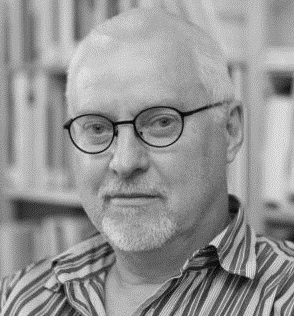
Prof. Dr. Hans Joosten (Netherlands / Germany) - Professor Emeritus of Peatland Science and Paleoecology at the University of Greifwald, Germany, partner of the Greifswald Mire Centre, and Secretary General of the International Mire Conservation Group. Author of more than 600 scientific articles and other publications on peatlands. Since 2009 he has been intensively involved in the UNFCCC negotiations and the development of IPCC guidelines, especially on accounting for emissions from drained peatlands, and in FAO in promoting climate-responsible peatland management. In addition to his main interest in peatland ecology and their worldwide conservation, he has for many years been interested in the cultural and historical background of human relationships with wetlands, which is reflected in some of his work, including analyses of perceptions of wetlands in ancient culture and mythology, which will be the main theme of his contribution at our WWD event.
Prof. dr Hans Joosten (Holandia / Niemcy) - emerytowany profesor torfoznawstwa i paleoekologii na Uniwersytecie w Greifwaldzie w Niemczech, partner Greifswal Mire Centre i sekretarz generalny International Mire Conservation Group. Autor ponad 600 artykułów naukowych i innych publikacji na temat torfowisk. Od 2009 roku jest intensywnie zaangażowany w negocjacje UNFCCC i rozwój wytycznych IPCC, szczególnie w zakresie rozliczania emisji z odwodnionych torfowisk, a także w FAO w promowanie odpowiedzialnego za klimat zarządzania torfowiskami. Oprócz głównego zainteresowania ekologią torfowisk i ich ochroną na świecie, od wielu lat interesuje się kulturowym i historycznym podłożem relacji człowieka z terenami podmokłymi, co znajduje odzwierciedlenie w niektórych jego pracach, w tym w analizach postrzegania terenów podmokłych w starożytnej kulturze i mitologii, co będzie głównym tematem jego wystąpienia podczas naszego wydarzenia WWD.
Program - 5 February 2022 / program in pdf
(program updated 30.01.2022 / program zaktualizowany 30.01.2022)
11.00 Opening of the World Wetlands Day 2022 – Wiktor Kotowski and Magda Galus (CMok)/ Wprowadzenie
11.05 Refugees on the marshes - testimony of the events on the Polish-Belarusian border./ Uchodźcy na bagnach - świadectwo wydarzeń na granicy polsko-białoruskiej.
11.15 - 13.45 Wetlands of the Middle East/ Mokradła Bliskiego Wschodu
11.15 Hans Joosten: Marshes and wetlands in the testimony of ancient Middle Eastern cultures./ Bagna i mokradła w świadectwie starożytnych kultur Bliskiego Wschodu.
11.45 Tamara Abdul Hadi: This was Biblical Eden. Ahwar marshes and their inhabitants./ To był biblijny Eden. Mokradła Al Ahwar i ich mieszkańcy.
12.15 Azzam Alwash: Is it possible to restore a lost paradise? Origin, degradation and restoration of Mesopotamian wetlands./ Czy możemy odzyskać raj? O degradacji i restytucji mokradel Mezopotamii.
12.45 Salman Khairalla: Environmental activism and the search for inspiration / Ekologiczny aktywizm i poszukiwanie inspiracji.
13.15 Kaveh Madani: Will we go on a war for water? (screening of TEDx talk followed by online interview)/ Czy będzie wojna o wodę?
13.45-14.30 Break / Przerwa
14.30-16.00 Wetlands of Africa/ Mokradła Afryki
14.30 Samer Elshehawi: Re-discovering papyrus in the Nile. Results of recent peatland inventories in the Nile Basin. / Ponowne odkrywanie papirusu nad Nilem. Wyniki ostatnich badań na torfowiskach w zlewni Nilu.
15.00 Karounga Keita: Wetland degradation and migration in the African Sahel./ Degradacja mokradeł a migracje na obszarze afrykańskiego Sahelu.
15.30 Ifo Suspense Averti: Large peatlands of the Congo Basin and their importance for the global climate./ Wielkie torfowiska w zlewni rzeki Kongo i ich znaczenie dla globalnego klimatu.
16.00-17.00 Panel discussion: wetlands, water and peace / dyskusja panelowa: mokradła, woda, pokój.
Some picteres from Iraqi wetlands / Zdjęcia irackich mokradeł (photo: Azzam Alwash)
